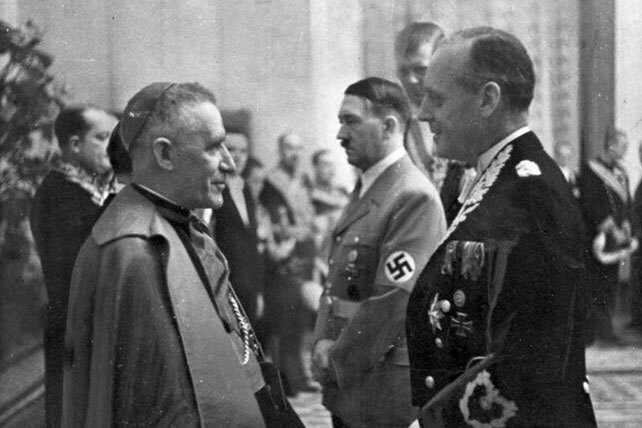Ahead of this week’s 75-year observance of the end of World War II in Europe, bishops of the German Catholic Church released a document admitting that their predecessors “made themselves complicit in the war” by not opposing it “with a clear ‘no.’”
German Catholic Church Issues ‘Confession of guilt’
Last week, the country’s council of Catholic bishops issued what one church official labels a “confession of guilt,” filled with details about cooperation with the Nazis. For example, hundreds of priests provided spiritual care to German soldiers, thousands of churches were converted into military hospitals, and tens of thousands of nuns served as nurses.
“The bishops may not have shared the Nazis’ justification for the war on the grounds of racial ideology,” the document notes, “but their words and their images gave succor both to soldiers and the regime prosecuting the war, as they lent the war an additional sense of purpose.” German Bishop Heiner Wilmer adds that even if the WWII-era bishops experienced shifting perspectives as the conflict continued, “They did not pay enough attention to the suffering of others.”
Pope Was Silent During Holocaust, Documents Show
In early March, the Vatican opened the archives of Pius XII, who was pope from 1939 to 1958. Before the pandemic forced the archives to be shuttered again a week later, researchers found evidence that put the leader in a negative light. They claim Pope Pius knew about the mass extermination of Jews yet never criticized the Holocaust directly. Further, he hid information about German concentration camps from U.S. officials, and the Catholic Church (possibly with U.S. assistance) helped former Nazis escape to South America.
Pius, who’s been called “Hitler’s pope,” had been on the track to sainthood, but now that appears to be on hold. His defenders claim he was a quiet diplomat who worked to hide Jews at the Vatican and in churches and monasteries. The Vatican had previously published 11 volumes of documents from Pius’ archives.
Hubert Wolf, a Catholic priest who led a German research team through the briefly opened archives, says the task ahead is daunting. Millions of pages need to be arranged chronologically, carefully analyzed, and compared against the existing volumes. “If Pius XII comes out of this study of the sources looking better, that’s wonderful,” says Wolf, a respected author and professor. “If he comes out looking worse, we have to accept that, too.”
Lessons for Today
Findings from the archives are important for more than historical purposes, say church officials. Bishop Georg Batzing, president of the German Catholic Church bishops’ conference, says modern-day leaders must “carry the legacy into the future”—especially as Europe faces “the old demon of division, nationalism, ‘ethnic’ thinking, and authoritarian rule.”
Batzing adds that because “terrifying anti-Semitism is widespread, even here in Germany,” students of history must take a strong stand against such beliefs. “This applies without ifs and buts to the church,” he says, “which is committed to the gospel of peace and justice.”
An advocate of reforms in the Catholic Church, Batzing says believers need to stand “against racism and agitation” and also maintain dialogue “with our Jewish brothers and sisters in faith.”

